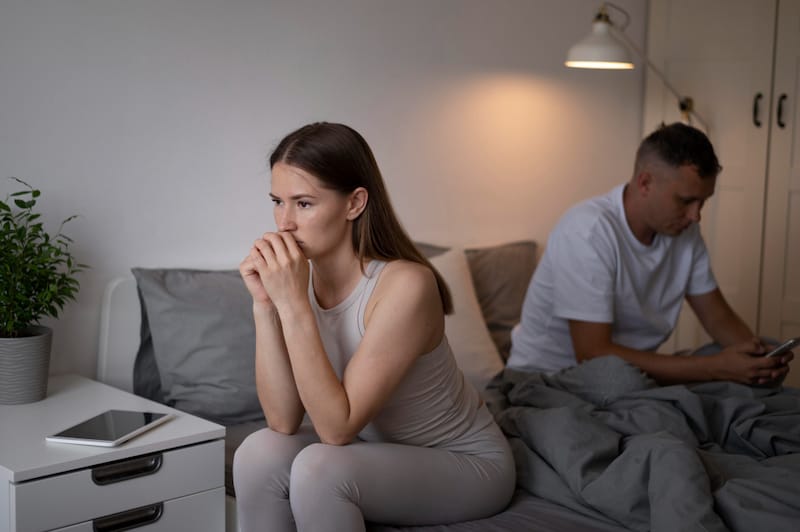When your girlfriend has anxiety, you‘ll notice changes in her thoughts and behaviors. For example, she might not be as intimate with you as before, or she would feel like a different person and always on edge. The very first thing you can do is understand more about anxiety. When you know more about its hard truth, you’ll be able to come up with ways to help manage it from ruining your relationship. You also need to understand that it’s “you and your partner” vs. “their anxiety.”
Dating a partner with anxiety can be quite challenging. But that doesn’t mean you both can’t be happy or enjoy the relationship.
Like in any other of your relationships, you put in the effort, time, and patience to make them work.
And when dealing with your romantic partner who struggles with anxiety or anxiety disorder, you might need to put more into the table.
8 signs that your partner has anxiety
Anxiety is normal but can become so intense and overwhelming that it will consume your energy, which can strain your daily life and relationships.
It can kick in in romantic relationships even when everything is going relatively well.
If your partner has anxiety, it can mess up the relationship, compromising the trust and intimacy you both have built towards each other.
It will also cause a lot of frustrations and disappointments when neither of you gets their needs meet.
During your first date with your special person, they may not be comfortable telling you immediately that they’re dealing with anxiety or anxiety disorder.
Sometimes, it could also be tough for you to understand that your partner struggles with anxiety, especially when they don’t tell you anything.
Below could be signs that you’re partner has anxiety:
1. You’re not on the same page
Whenever you and your partner have a conversation, it goes differently than planned. Or it would feel like you’re both using different languages.

As most psychologists say, you will speak off of logic, and your anxious partner will speak from their emotions.
There would also be a constant struggle to make eye-to-eye conversations, and you would most likely feel like “you’re lost in translation.”
2. They avoid places and stressful situations
If you have an anxious partner, they would (almost) always want to avoid things and situations.
For example, your partner may avoid having deep or big conversations and may even suddenly shut you down or walks out from arguments.
They wouldn’t also like to go out in public or refuse to meet with friends, go on a double date, travel, and do other things that would keep them out of their comfort zone.
3. They don’t “feel” like themselves
Anxiety can make your partner feel or act like a different person than you’ve known them before.
They may not participate or enjoy the things you used to do together before.
You may also notice how they (almost) always seem unhappy.
4. They might have trouble sleeping and loses their appetite

If you’re living with your partner, you might notice they are most likely to stay up late at night or spend most of their time tossing and turning in bed.
They might also complain about having nightmares and feeling tired all the time.
Anxiety may also change the eating habits of your partner.
You might notice them losing their appetite or, contrarily, overeating to comfort themselves.
Sometimes, they may also turn to alcohol to cope.
5. They get sick a lot
People with anxiety get sick almost all the time because their body is constantly responding to stress which weakens the immune system.
They’ll experience symptoms like stomachaches, headaches, dizziness, sweating a lot, heart palpitations, and shortness of breath.
6. They’re restless
You will most likely feel like your partner is “always on guard” or having nervous habits like, for instance, constantly tapping their foot, pacing around the room, or fidgeting with their hands.
Your partner will regularly feel their “flight-of-fight response,” which is supposedly reserved for life-and-death situations. Still, people who struggle with anxiety will be extremely sensitive to their surroundings.
They will become restless or constantly think about what could go wrong.
7. They keep on worrying and seem distrustful
Your anxious partner may worry about daily life and activities while unable to control their nervousness or overcome these constant worries.
Mostly, past relationships can contribute to trust issues, especially if their partner has made a mistake or betrayed their trust.
They always want to know your whereabouts and check in on you constantly.
8. They become irritable
Even with small things, you’ll notice your partner become cranky and starts a fight.

It’s because anxiety will make them feed on negative thoughts, which decreases their ability to handle stressful situations, causing them to be mad at you or appear suddenly in a bad mood.
10 things you can do to stop anxiety from ruining your relationship
So, you have deduced or asked your girlfriend or boyfriend that they have anxiety, and now, you’re thinking of ways to prevent it from ruining your relationship.
Anxiety has no cure, but some ways can help manage and treat the symptoms and, at the same time, show support to your partner as they battle through it.
Below are what you can do:
1. Learn and understand more about anxiety
You can browse through the internet, read books about anxiety, or even talk to a psychologist to familiarize yourself more with anxiety.
It’s very helpful to know the reality of anxiety to understand how and why it’s affecting your partner.
From there, you can create steps to help and show support to your partner.
2. Talk to them
Have an honest and open conversation with no judgment with your partner.
Ask them what they want. They might know what would make them feel better. Always turn to the person you want to show support to.
They know themselves better, so if you’re in doubt about what you should do, ask them, and together, you can learn the best ways to help manage their symptoms.
3. Stay calm and empathize
Remember to stay calm and be compassionate with your partner, especially when your conversations go awry.
If you had your own experiences when you were also anxious, share them with them and open up the conversation.
Empathizing with your partner will be helpful; maybe they can figure out what they want to do.
4. Don’t try to fix them
You are your partner’s boyfriend or girlfriend, not their therapist.
Don’t try to put some idea on how they should act, think, and feel. They probably have known about it and have tried doing that to themselves.
Telling your partner what they already know is a bad move. It would only make them feel small about themselves and could worsen their condition.
5. Make them feel safe and accepted

An anxious person might think that they’re unlovable or that they’re not good enough for you.
Always remind them that you are “on it” together and you’re helping them to feel better because you love them and want to see them happier.
6. Let them know what’s happening
Your anxious partner will more likely be sensitive and perceptive to their surroundings.
They will quickly sense that something’s going on.
So, make sure you don’t make them overthink more, and just let them know if something’s up. For example, if you’re going to be late on your date, call or text them why.
7. Know your limits
Always put in your mind that you’re only helping your partner in managing their symptoms.
Avoid accommodating their anxiety by doing things for them or keeping them away from triggers.
Help them with what they wanted to try but had a hard time doing so. Also, only do so when it’s not against your will.
You can’t do everything for your partner and see them get better at managing their symptoms on their own.
So, be mindful of your role in the relationship and set boundaries.
8. Assist them in therapy
Psychotherapy, along with some medications, can help treat anxiety. Therapists study treating mental health issues like anxiety.
They can help your partner, which you cannot and shouldn’t. So, assisting them in therapy and taking your separate session would be really helpful.
9. Have quality time together
Happiness could mean being calm for your partner with anxiety. Ask them what activities they want to do would make them feel relaxed.
It could be having a picnic, watching the sunset on the beach, reading books, or doing meditation exercises.
10. Take care of yourself and live your life
Don’t forget to live your life too!
You may get to that point where you’ll feel really stressed, worried, angry, disappointed, sad, and even anxious when looking after your partner.
You should take care of your well-being too. As the saying goes, “You can’t pour from an empty cup.”
Meet with your friends, attend that birthday party, or visit your parents. But don’t forget to check on your partner while you are away.
FAQs
How do you know when a relationship is really over?
Below are some signs that your relationship is over:
1. You fight frequently and cannot stand on common ground or feel the sense of connection as it was before.
2. You both don’t bother to bring up your disagreements to resolve the issue because you know you’ll only lose control.
3. You constantly want to take a break from each other.
4. here’s a lack of intimacy.
5. One of you wants to seek counseling while the other doesn’t.
6. You wonder about being alone or being with another partner. Both of you have lost respect for each other’s values and lost the desire to grow together.
7. You developed trust issues and cannot forgive and rebuild your trust.
8. You don’t celebrate wins and joy in life anymore nor reach out in challenging times.
9. You don’t feel heard and have grown resentment towards each other.
10. One of you feels hopeless that your relationship can still work out.
Conclusion
Anxiety can interfere with the relationship you have with your partner. It affects your thoughts, emotions, and actions, leading to behaviors that can cause distress and misunderstandings between you and your partner.
Someone dealing with anxiety has their life revolve around negativity. They have many worries, fears, insecurities, and “what ifs” that would cause stress and form barriers between them and their partner.
So, when you notice the signs that your partner has anxiety, it’s essential to learn more and understand how and why it affects your partner.
Have an open and honest conversation with them and learn together what ways you can do to manage the symptoms. Don’t tell them what to do or try to do things for them.
Just support them and assist them in what they need. It will require much effort and patience for a partner with anxiety, but everything will be worth it.


